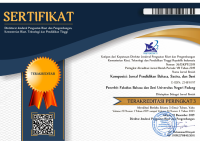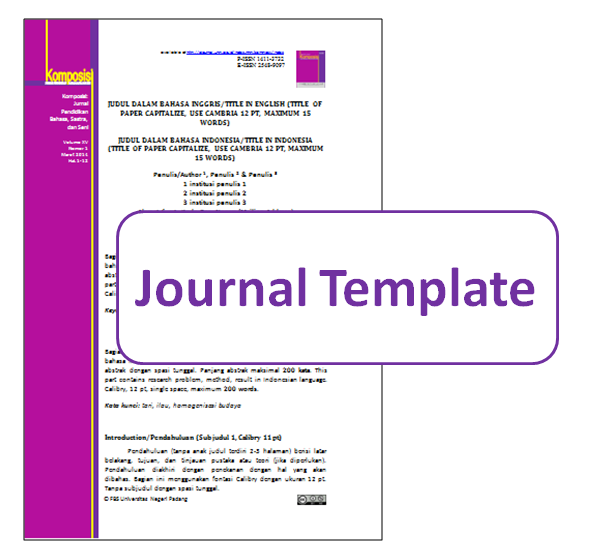EMPOWERING STUDENT’S CRITICAL THINKING BY APPLYING PROJECT BASED LEARNING
 ), Winda Efyanto(2),
), Winda Efyanto(2), (1) Putera Batam University
(2)
 Corresponding Author
Corresponding Author
Copyright (c) 2018 Komposisi: Jurnal Pendidikan Bahasa, Sastra, dan Seni
DOI : https://doi.org/10.24036/komposisi.v19i2.100657
Full Text:
 Language : id
Language : id
Abstract
This research is focused on fostering students’ critical thinking through Project-Based Learning. It is based on the findings of the previous studies which show that University students in Batam mostly still have low quality of Critical Thinking. The design of the research was quasi-experimental research that want to find out the effect of Project Based Learning towards Criical Thinking of University students in Batam. To know students’Critical Thinking, this research uses Critical Thinking test. There are three pre tests and post tests. The pre-test were used to see students’ Critical Thinking before having treatment and posttest are used to see the differences on students critical thinking after giving treatments.The subjects were the students of English Department of Putera Batam University who took Speaking class. The data found that Project Based Learning has a significant effect on students' Critical Thinking skills. This conclusion can be seen based on the analysis that has been done where t observed > t table. t observed = 3,83 and t table 2.36 with standard significant 0,05.Thus, it can be concluded that Criticak thinking skills can be increased by using Project Based Learning method.
Keyword: Empowering, Project Based Learning, Critical Thinking,University Students.
MENINGKATKAN KEMAMPUAN CRITICAL THINKING MAHASISWA DENGAN MENERAPKAN PROJECT BASED LEARNING
Abstrak
Penelitian ini difokuskan pada pengembangan Critical Thinking mahasiswa melalui metode Pembelajaran Project Based Learning. Hal ini didasarkan pada temuan penelitian sebelumnya yang menunjukkan bahwa mahasiswa Universitas di Batam sebagian besar masih memiliki Critical Thinking yang rendah. Desain penelitian ini adalah penelitian kuasi-eksperimental yang ingin mengetahui pegaruh pembelajaran Project Based Learning terhadap Criical Thinking mahasiswa di Batam. Untuk mengetahui kemampuan Critical Thinking mahasiswa, penelitian ini menggunakan tes Critical Thinking. Melalui tiga kali pre tes dan pos test. Pre-test digunakan untuk melihat kemampuan Critical Thinking sebelum menjalani perlakuan dan posttest digunakan untuk melihat perbedaan skor Critical Thinking pada mahasiswa setelah diberikan perlakuan. Subjek penelitian adalah mahasiswa dari Jurusan Sastra Inggris Universitas Putera Batam yang mengambil kelas Speaking. Data yang ditemukan menunjukan bahwa Project Based Learning memiliki pengaruh yang signifikan terhadap kemampuan Critical Thinking mahasiswa. Kesimpulan ini dapat dilihat berdasarkan analisis yang telah dilakukan dimana t tabel ˂ t yang observed. t observed = 3,83 dan t tabel 2,36 dengan standar signifikan 0,05. Jadi, dapat disimpulkan bahwa kemampuan Critical Thinking dapat ditingkatkan dengan menggunakan metode pembelajaran Project Based Learning.
Kata Kunci: Meningkatkan,Project Based Learning,Critical Thinking,Mahasiswa
References
Anand Jayprakash Vaidya, A. E. (2011). Logic and Critical Reasoning.
Bowell, T., & Kemp, G. (2005). Critical Thinking: A Concise Guide, Second Edition. Canada: Routledge.
Bren, B., Cook, J., Durham, M., Emrey, J., & Yu, L. (2014). Assessing critical thinking across the curriculum, 2014.
Conesa, V. M. (2016). Indonesian Students wants to be Entrepreneurs, but Lacks Plenty of Skills. Www.techinasia.com. Retrieved from https://www.google.com/url?sa=t&rct=j&q=&esrc=s&source=web&cd=11&cad=rja&uact=8&ved=2ahUKEwj0nNfXp5nfAhXBN48KHbZuDMYQFjAKegQIBRAB&url=https%3A%2F%2Fwww.techinasia.com%2Ftalk%2Findonesian-students-entrepreneurs-but-lack-qualifications&usg=AOvVaw2jVUGLYKItIzGaHi3oJ9tO
Drew, D. M. (2008). Critical Thinking and Leadership.
Dwyer, C. P., Hogan, M. J., & Stewart, I. (2015). The effects of argument mapping-infused critical thinking instruction on reflective judgement performance, 16, 11–26.
García, C. (2016). Project-based learning in virtual groups - collaboration and learning outcomes in a virtual training course for teachers. Procedia - Social and Behavioral Sciences, 228(June), 100–105. https://doi.org/10.1016/j.sbspro.2016.07.015
Gay, L., Mills, Airasian, P. (2006). Educational Research Competencies for Analysis and Appliction. NewYork: Prentice Hall.
Indonesia, I., Nation, U., Goals, S. D., Indonesia, S., & Nam, V. (2016). © oecd 2016, 1–8.
J.Larmer, J.Margendoller, S. B. (2015). Setting the Standard for Project Based Learning. NewYork: ASCD.
Kettanun, C. (2015). Project-based Learning and Its Validity in a Thai EFL Classroom. Procedia - Social and Behavioral Sciences, 192, 567–573. https://doi.org/10.1016/j.sbspro.2015.06.094
Kurubacak, G. (2007). Building knowledge networks through project-based online learning : A study of developing critical thinking skills via reusable learning objects, 23, 2668–2695. https://doi.org/10.1016/j.chb.2006.08.003
Muliawan, W., & Nahar, W. S. (2017). The Effectiveness of Project Based Learning in Trigonometry.
Musa, F., Mufti, N., Latiff, R. A., & Amin, M. M. (2012). Project-based learning (PjBL ): inculcating soft skills in 21 century workplace, 59(2006), 565–573. https://doi.org/10.1016/j.sbspro.2012.09.315
Ponce, O. A., Juan, S., & Rico, P. (2017). Educational research in the 21st century: challenges and opportunities for scientific effectiveness, (June).
Shirkhani, S., & Fahim, M. (2011). Enhancing Critical Thinking In Foreign Language Learners, 29, 111–115.
Teresa, M., Nuñez, E., & Medina, A. M. (2018). Enhancing Critical Thinking Skills through Political Cartoons : A, 16(16), 141–163.
Wogu, P. (2016). An Introduction to Logic, Critical Thinking and Arguments in Philosophy, (June).
 Article Metrics
Article Metrics
 Abstract Views : 809 times
Abstract Views : 809 times
 PDF Downloaded : 95 times
PDF Downloaded : 95 times
Refbacks
- There are currently no refbacks.
Copyright (c) 2018 Komposisi: Jurnal Pendidikan Bahasa, Sastra, dan Seni

This work is licensed under a Creative Commons Attribution-NonCommercial 4.0 International License.











